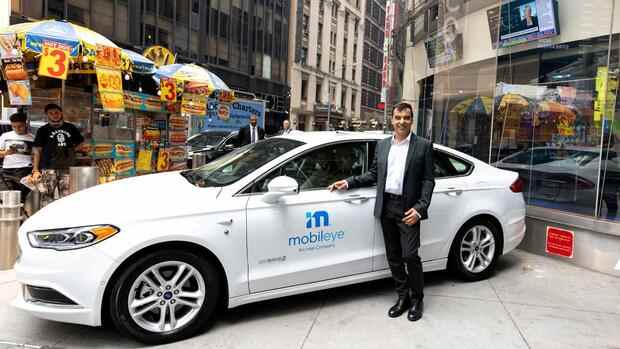The stock market comeback is planned for the middle of next year.
(Photo: Reuters)
San Francisco The world’s largest chip company Intel wants to bring its subsidiary Mobileye to the stock exchange in the middle of next year. The company announced this on Tuesday. According to calculations by the Reuters news agency, the Israeli-based company is likely to be valued at more than $ 50 billion when it comes back to the stock market. For comparison: the automobile manufacturer BMW has a market capitalization of 58.6 billion dollars.
Intel had taken over camera technology specialist Mobileye in 2017 for 15.3 billion dollars, followed by the withdrawal from the stock market. “The takeover of Mobileye by Intel was a great success,” said Intel CEO Pat Gelsinger. Mobileye has “achieved record sales”. Mobileye founders Amnon Shashua and Gelsinger have come to the conclusion “that an IPO will help Mobileye to innovate”.
The recently acquired mobility service provider Moovit will also continue to operate as part of Mobileye. The price of the Intel share rose on Tuesday morning by more than 7.5 percent.
Mobileye is a global leader in the development of advanced driver assistance systems (ADAS for short) and offers, among other things, solutions for autonomous driving. The company, which with almost 14,000 employees is the largest employer in the Israeli high-tech industry, competes with chip manufacturers Nvidia and Qualcomm for a place in the cockpit of global automakers. In contrast to its rivals, Mobileye offers a camera-based system that supports you while driving.
Top jobs of the day
Find the best jobs now and
be notified by email.
In addition to the Alphabet subsidiary Waymo and Cruise, the competition also includes large German car manufacturers – such as Daimler, VW and BMW, as well as industry suppliers, Apple and various start-ups. The difficulties faced by the leading US tech companies show that the development of reliable technologies is not that easy. Developing fully autonomous vehicles “is more of a challenge than launching a rocket and putting it into orbit around the earth,” said former Waymo boss John Krafcik.
Even Apple, the most valuable corporation in the world, is making little progress in developing software for autonomous driving. The business of sensors for autonomous driving is a billion-dollar market. According to a study by McKinsey, by 2030 it should be possible to earn eight billion dollars with camera technology alone, and 14 billion dollars with radar sensors.
Largest IPO in Israeli software history
Mobileye was founded in 1999 by Israeli engineers Ziv Aviram and Amnon Shashua. In 2004 the company developed the first EyeQ camera designs. Three years later, they were able to recognize traffic signs, and a little later they provided the information required for automatic braking and a rear-end collision warning system.
In 2014, Mobileye went public for $ 5.3 billion on the New York Stock Exchange – the largest IPO in the Israeli software industry. Since then, sales and technical innovations have grown continuously. Between 2011 and 2015, revenues increased tenfold to $ 240 million. At the same time, the camera system went into series production in 160 car models from 25 manufacturers.
In 2020, Mobileye had revenues of $ 1 billion. This year the company expects an increase in sales of over 40 percent compared to the previous year. From 2022 Mobileye and Sixt plan to bring a robotaxi service with self-driving vehicles to Germany. Passengers should be able to book the service via Intel’s Moovit app and the Sixt app. Mobileye technology is also expected to be used in driverless vans from 2023. The vehicle developer Udelv wants to bring more than 35,000 of these self-driving vans onto the market by 2028.
Mobileye boss Shashua drew a positive balance: “Mobileye has grown strongly since joining the Intel family and has almost tripled its annual chip deliveries, sales and the number of employees since the takeover,” he says. “By working with Intel, our company receives important technologies and free cash flow.” In this way, the group can finance its development work “from current income”.
More: Only months old, already worth billions: What the fastest unicorns in Europe have in common
